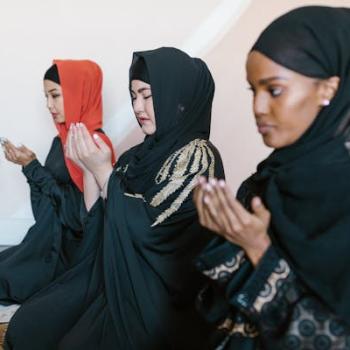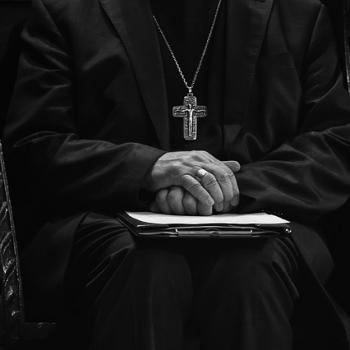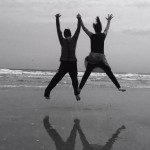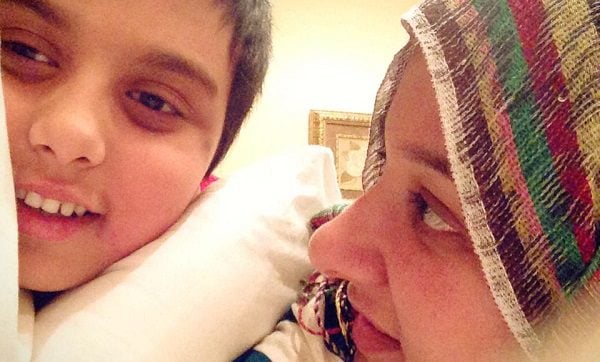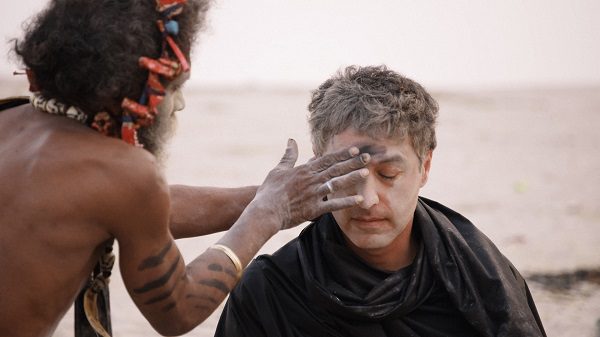
How do people personally experience religion and faith? Why do they believe what they believe, and is there any way for us to find a connection with people who have vastly different belief systems from our own? Author, scholar and Muslim American Reza Aslan immerses himself into different faiths and faith rituals around the world to explore these and other questions in “Believer,” a new CNN series debuting March 5 at 10 p.m.
In this spiritual adventure series, Aslan dives deep into faiths around the globe, from Scientology in the U.S. to Hindu asceticism in India to Santa Muerte in Mexico to an apocalyptic doomsday cult in Hawaii. By opening himself up to people in these faith traditions and asking them to open themselves up to him, Aslan seeks universal truths that he hopes will help viewers see different people less as “the other” and more as fellow human beings.
I had the pleasure of talking with Aslan about season one of “Believer,” on how this series is different than “faith tourism” and whether acceptance and understanding is possible in an increasingly divided and hostile world.
**********
Why is it most important now to understand belief from a faith perspective? Where has belief led us – people of faith, in what you have seen?
There’s no question that we are in a very divided time, not just in the U.S. but in the world. A lot of that division comes from religious and ethnic bigotry – it has ripped a large swath of our population. It is very easy to point to someone who looks different from us and say they are the “other.” They are not us. In many ways, this show is the antidote to that.
A lot of religions we profile tend to be on the margins, look foreign, exotic and even scary. Hopefully through my immersion, they will start to look a little less scary. Maybe you’ll start to recognize some of your own beliefs. That’s what is really needed most of all — the ability to look beyond the simple labels that separate us into different religions, ethnicities, nationalities.
You have immersed yourself in a variety of faith traditions, from Hindu asceticism in India to a doomsday cult in Hawaii – how did you choose where to go?
We had a long, giant list of religious communities we wanted to explore. — religions that are misunderstood or feared. Other choices were literally what we could get away with. There never has been a show like this before. We didn’t have a template. We figured it out as we were doing it. It was a combination of the things I was interested and the things we could pull off. The hope is that we get a second season, and then the sky’s the limit.
What are you hoping viewers will learn or absorb?
I want the viewer to be entertained. These episodes are fun, emotional and informative. How is religion expressed and understood? The hope is that the audience will start to recognize their own beliefs, the way they think of the world. Once you start to see these individuals as people and less as symbols, they start to make more sense.
The doomsday cult is a perfect example of what we’re talking about. The first time you meet this leader – JeZeus, I would not blame you in thinking this guy is off the clocker. I thought, oh boy, what have I gotten myself into? A few days after being immersed in the group, the second time I was with him I said to him, “No more performing. Just be a person with me.”
He said, “Maybe I’m right, maybe I’m wrong, I don’t know. But I do think that we are on a collision course with catastrophe if we don’t figure out what to do.” Suddenly it doesn’t seem that crazy anymore.
Tell me something that surprised you about yourself as you worked on this series
One of the most surprising aspects for me was when I found myself agreeing intellectually with certain viewpoints, but then struggling when asked to put that belief into some kind of practice. Forcing myself to do these things was quite an emotional thing for me
Do you think it’s possible, though, to really capture the essence of different belief systems by this sort of immersion process? What about those who say it’s like faith tourism?
It’s certainly the case that these experiences are just the beginning. There’s quite a difference from immersing yourself in a community for a couple of weeks and making this your life. I think to the question of is this “religion tourism,” I’d say I’m not there to just observe. I’m there to experience.
These communities, because of what they understood about my desire and my goals, all opened themselves up to me completely. And, some of these communities are completely insular and closed off.
One may say, well, that’s not an authentic experience because you can come home. But the authenticity is not about the length of time one spends, but the connection one has with that community. There was a very real connection between me and the groups that I joined. There was a union. I’m still in touch with them.
Is it possible for viewers completely outside of another’s faith traditions to gain an understanding and appreciation for what another believes? By watching a series like this, can folks move towards that more acceptance of each other?
Not only do I think the case, that is the whole reason I made this series. Through relationships we change our perceptions of each other. Not a lot of people are going to meet the people I met in this series. This will introduce the audience to different faiths and let them experience them through my experience of them. That was the whole point. I do think it happens – a shift in people’s perceptions, changing the way people think. The people who have seen these episodes have all had this experience, coming away thinking, “Ok, that wasn’t as weird as I thought it was. I actually believe a little bit of what they believe.”
What have you learned, or would like us as viewers and seekers to know, about what it means to believe?
This show is for people who have no faith experience as well as people who do. No matter who you are, we all have beliefs. And that those beliefs, despite what a lot of secular minded people would say, shape who we are.
The argument that I have with New Atheist is that atheism is a lack of belief. But atheism is not a lack of belief. It’s a different kind of belief. It’s a belief predicated on an understanding of the nature of the universe. And that understanding is as affected as religious belief is by what tiny bit of knowledge we have about the universe. If we recognize that our beliefs are just as valid as other’s beliefs – they may not be just as rational or based on empirical evidence – but they are just as valid, that is good
Did you discover universal truths in the different belief systems you encountered? Or universal differences?
I don’t think discover is the right word. I’ve been immersed in this search for 20 years. I think the word is “found.” That word is strengthened in my mind. Underneath the different languages and metaphors we use to express our desire for transcendence, it is the same desire. It starts with a recognition that we are whatever else we are – eternal beings. There is something that is about us that goes beyond the material world. That we’re more than just the sum of our bodies. There’s more to it than that.
The single most unifying idea throughout the history of religion is that there is more. There is something beyond. And, certainly in these fixed religious traditions that I focused on, this is an integral part of their belief systems.
They all have this desire to connect with something beyond. A belief that there is more to them, more to this life then something we can experience with our senses.



